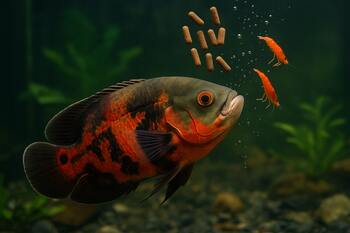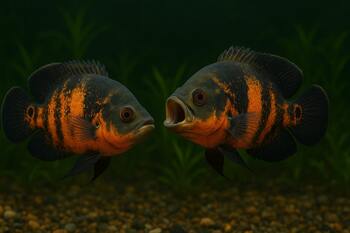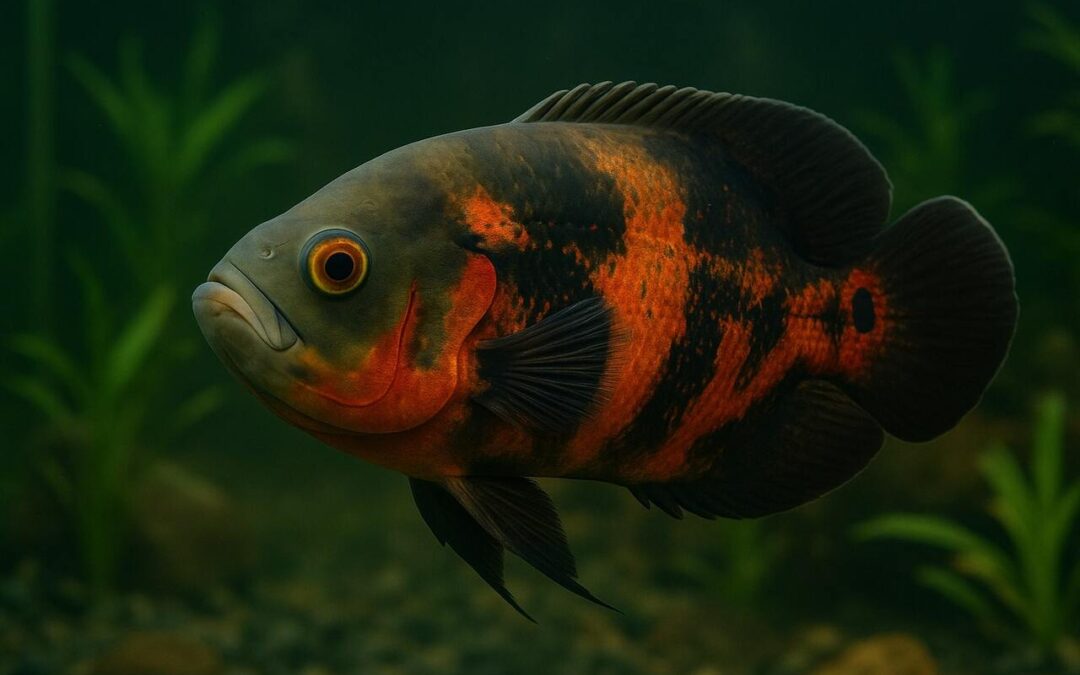If you’ve ever owned an Oscar fish, you know how full of personality they are. Oscars (Astronotus ocellatus) are intelligent, expressive, and surprisingly interactive aquarium fish — they’ll often recognize their owners and even beg for food! But behind that charm lies a big responsibility: feeding them properly.
Oscars are large, active omnivores with strong appetites. To keep them healthy, you’ll need to provide a balanced, varied diet that mimics what they’d eat in the wild — a mix of protein, vegetables, and occasional treats. Here’s a complete guide on what to feed your Oscar fish, how often, and what to avoid.
The Foundation of Their Diet: High-Quality Cichlid Pellets
Every Oscar owner should start with one essential item: high-quality cichlid pellets. This should form the staple of their diet, as it provides balanced nutrition tailored for large, carnivorous cichlids.
Choose floating or sinking pellets depending on your Oscar’s preference. Floating pellets make it easier to watch your fish feed, while sinking pellets are ideal if you keep bottom dwellers alongside them. Look for pellets rich in:
- Crude protein (around 40–45%)
- Omega fatty acids for vibrant color
- Natural ingredients like krill, shrimp, and spirulina
Another good alternative is cichlid sticks, which are slightly larger and can satisfy your Oscar’s chewing instincts.
Tip: Vary the brand or formula every few months to prevent dietary boredom and nutrient imbalance.
Protein Power: Meaty Foods for Growth and Strength
Oscars are natural predators, and protein is a key part of their diet. While pellets provide a nutritional foundation, supplementing with high-protein foods keeps them active, colorful, and strong.
Best Protein-Rich Foods for Oscars
- Freeze-dried or frozen shrimp: A favorite among Oscar keepers. These are packed with protein and mimic the crustaceans Oscars hunt in the wild.
- Bloodworms and mealworms: Excellent as occasional treats — they enhance color and vitality.
- Other seafood: Small, finely chopped pieces of mussels, scallops, clams, or squid can be offered once or twice a week. These provide amino acids and minerals not found in pellets.
- Live insects: If available, earthworms or crickets can be an exciting, natural snack. They trigger hunting instincts and offer clean, digestible protein.
Frozen foods should always be thawed and rinsed before feeding to avoid clouding the tank water.
Avoid: Feeder fish. While Oscars may eat small fish in the wild, feeder fish sold in pet shops often carry parasites or bacterial infections, which can harm or even kill your Oscar.

Don’t Forget the Greens: Vegetables and Fruits
Though Oscars are mainly carnivorous, a small portion of their diet should include vegetables and fruits. These provide essential vitamins, fiber, and natural antioxidants that help with digestion and boost immunity.
Safe Vegetables for Oscar Fish
- Cooked peas: Great for digestion and preventing bloating.
- Zucchini and cucumber: Soft, easy to nibble, and packed with water and vitamins.
- Spinach or lettuce (occasionally): Provides plant fiber, though not all Oscars will eat leafy greens.
Safe Fruits (Occasionally)
- Melon or cantaloupe: Sweet, hydrating treats they usually enjoy.
- Banana: Soft and nutritious — feed in very small pieces.
Always remove seeds and skins before serving, and only feed small amounts once or twice a week. Fruits should never replace their main protein diet but can be fun, colorful treats.
Feeding Schedule and Portion Control
Oscar fish are greedy eaters — they’ll often act hungry even when full. Overfeeding can lead to bloating, obesity, and poor water quality.
Here’s a balanced feeding guideline:
- Young Oscars (under 6 inches): Feed 3–4 times a day, small portions they can finish in 2–3 minutes.
- Adult Oscars: Feed 1–2 times a day, no more than they can eat within 3 minutes.
Remove any leftover food to prevent ammonia spikes and murky water.
A good routine is to mix up their meals — pellets in the morning, frozen shrimp in the afternoon, and a few veggies or treats later in the week. Variety keeps them mentally engaged and nutritionally balanced.
Tips for a Healthy Feeding Routine
Feeding Oscars isn’t just about nutrition — it’s also about keeping them active and happy. Here are some tips from experienced aquarists:
- Use feeding tongs or tweezers to offer live or frozen foods. This keeps your hands clean and reduces contamination risk.
- Observe their behavior. If your Oscar stops eating suddenly, check water quality — poor conditions can reduce appetite.
- Fast them once a week. Giving your fish a “fasting day” allows their digestive system to rest and prevents bloating.
- Keep food varied. Just like humans, Oscars can get bored of repetitive meals. Rotate their diet regularly.
Foods to Avoid
Some foods may seem fine at first glance but can be harmful or cause long-term health issues for Oscars.
Avoid feeding:
- Feeder fish: Risk of diseases and parasites.
- Raw meat (chicken, beef, pork): Too fatty and can cause digestive issues.
- Processed human foods: Contain salt, preservatives, and additives unsafe for fish.
- Goldfish flakes: Designed for smaller species, not suitable for Oscars’ nutritional needs.
Keeping their diet clean and natural will help your Oscars live longer and look more vibrant.
Signs of a Healthy Diet
You’ll know your Oscar’s diet is balanced when you notice:
- Bright, rich coloration (especially in red or tiger varieties)
- Steady growth and strong fins
- Active, curious swimming behavior
- Clear eyes and smooth scales
If your Oscar becomes sluggish, bloated, or loses color, it may indicate overfeeding or lack of dietary variety.
Enrichment Feeding: Make Mealtime More Engaging
Feeding Oscars doesn’t have to be routine — it can be a form of mental enrichment. In the wild, Oscars hunt, chase, and explore their environment for food. Bringing a bit of that natural behavior into the aquarium keeps them sharp and happy.
Try dropping shrimp or worms in different areas of the tank so they can “hunt” for them. You can even use feeding cones or slow-release feeders to make them work a bit harder. Some owners train their Oscars to take food gently from their hand — it’s a rewarding experience and strengthens the bond between you and your fish.
Another fun idea is to occasionally offer live insects (like crickets) on the surface. Watching your Oscar stalk and snap at them mimics their natural hunting instinct. Just make sure any live food is clean and pesticide-free.
Sample Weekly Feeding Plan
Here’s a simple meal plan you can follow:
| Day | Morning | Evening |
| Monday | Cichlid pellets | Frozen shrimp |
| Tuesday | Pellets + peas | Bloodworms |
| Wednesday | Pellets | Small piece of squid |
| Thursday | Cichlid sticks | Zucchini slices |
| Friday | Pellets | Banana or melon piece |
| Saturday | Pellets | Crickets or earthworms |
| Sunday | Fasting Day | — |
This plan provides a healthy balance of proteins, vegetables, and occasional fruit treats.

FAQs About Oscar Fish Food
1. What is the best food for Oscar fish?
High-quality cichlid pellets should be the main food, supplemented with frozen shrimp, bloodworms, vegetables, and occasional fruits.
2. Can I feed my Oscar fish feeder fish?
It’s best to avoid feeder fish due to the risk of disease and injury. Instead, offer safe protein options like shrimp or worms.
3. How often should I feed my Oscar fish?
Feed juveniles 3–4 times daily and adults 1–2 times daily, giving only what they can eat in 2–3 minutes.
4. Can Oscar fish eat fruits and vegetables?
Yes, but in moderation. Offer cooked peas, zucchini, cucumber, and small fruit pieces like banana or melon.
5. Why is my Oscar not eating?
Loss of appetite may be caused by stress, poor water quality, or overfeeding. Check tank parameters and adjust their diet.
Final Thoughts
Feeding an Oscar fish is one of the most enjoyable parts of keeping them. They’re smart, expressive, and love interacting during mealtime. A diet built on high-quality cichlid pellets, protein-rich foods, and occasional veggies or fruits will keep your Oscar not just alive — but truly thriving.
With a balanced feeding routine and a bit of variety, you’ll have a happy, healthy Oscar that shows off its best colors and personality for years to come.






